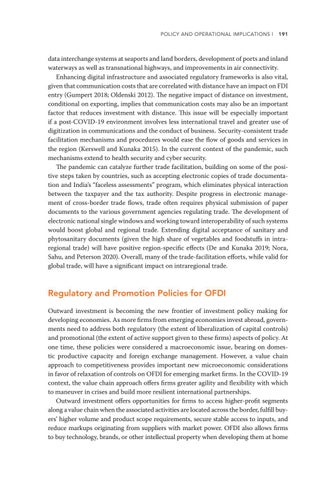POLICY AND OPERATIONAL IMPLICATIONS l 191
data interchange systems at seaports and land borders, development of ports and inland waterways as well as transnational highways, and improvements in air connectivity. Enhancing digital infrastructure and associated regulatory frameworks is also vital, given that communication costs that are correlated with distance have an impact on FDI entry (Gumpert 2018; Oldenski 2012). The negative impact of distance on investment, conditional on exporting, implies that communication costs may also be an important factor that reduces investment with distance. This issue will be especially important if a post-COVID-19 environment involves less international travel and greater use of digitization in communications and the conduct of business. Security-consistent trade facilitation mechanisms and procedures would ease the flow of goods and services in the region (Kerswell and Kunaka 2015). In the current context of the pandemic, such mechanisms extend to health security and cyber security. The pandemic can catalyze further trade facilitation, building on some of the positive steps taken by countries, such as accepting electronic copies of trade documentation and India’s “faceless assessments” program, which eliminates physical interaction between the taxpayer and the tax authority. Despite progress in electronic management of cross-border trade flows, trade often requires physical submission of paper documents to the various government agencies regulating trade. The development of electronic national single windows and working toward interoperability of such systems would boost global and regional trade. Extending digital acceptance of sanitary and phytosanitary documents (given the high share of vegetables and foodstuffs in intraregional trade) will have positive region-specific effects (De and Kunaka 2019; Nora, Sahu, and Peterson 2020). Overall, many of the trade-facilitation efforts, while valid for global trade, will have a significant impact on intraregional trade.
Regulatory and Promotion Policies for OFDI Outward investment is becoming the new frontier of investment policy making for developing economies. As more firms from emerging economies invest abroad, governments need to address both regulatory (the extent of liberalization of capital controls) and promotional (the extent of active support given to these firms) aspects of policy. At one time, these policies were considered a macroeconomic issue, bearing on domestic productive capacity and foreign exchange management. However, a value chain approach to competitiveness provides important new microeconomic considerations in favor of relaxation of controls on OFDI for emerging market firms. In the COVID-19 context, the value chain approach offers firms greater agility and flexibility with which to maneuver in crises and build more resilient international partnerships. Outward investment offers opportunities for firms to access higher-profit segments along a value chain when the associated activities are located across the border, fulfill buyers’ higher volume and product scope requirements, secure stable access to inputs, and reduce markups originating from suppliers with market power. OFDI also allows firms to buy technology, brands, or other intellectual property when developing them at home

